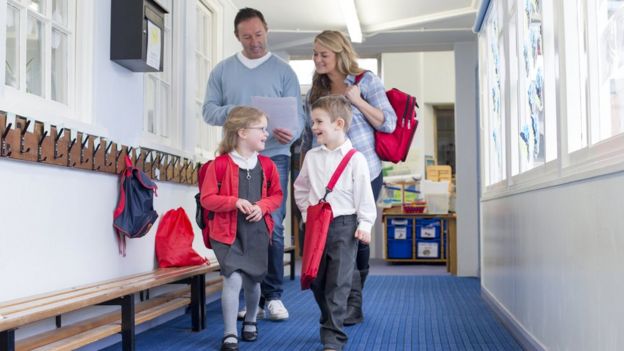
A teaching union has warned against reducing the influence of councils over the country’s education system.
The Scottish government has been consulting on plans to introduce new regional education boards, which would operate across council areas.
Some within local government fear the proposals could reduce their traditional role.
The EIS union said ensuring education was democratically accountable at a local level “remained key”.
The Scottish government consultation also covers its desire to hand as much power as possible to individual schools and head teachers as part of efforts to close the attainment gap between the country’s wealthiest and most deprived pupils.
This will include £120m of government funds which will go straight to head teachers to allow them to help children from disadvantaged backgrounds – with schools with the most disadvantaged pupils getting the most money.
- Schools review to ’empower’ teachers
- Councils ‘should resist school changes’
- Swinney lays out new education plans
It also wants to create new regional education boards which will be designed to support schools and help ones in different council areas work together more effectively.
However, details of what specific powers the boards will have and the regions they will cover have still to be decided.
The government has insisted that councils will still have legal responsibility for schools, and an important role to play in deciding how they are run.
But local government has been fiercely protective of its traditional role in the education system, with some wondering what practical powers they will retain after the new regional boards are introduced and greater powers are devolved to individual schools.
Speaking in October, Cosla president David O’Neill said the local government body would strongly resist any attempt to “centralise” the education system.
 Image copyrightTHINKSTOCK
Image copyrightTHINKSTOCKIn its response to the school governance consultation, which will close later on Friday, the EIS welcomed the commitment from the Scottish government that it will not remove education from local authority control.
And it praised ministers for ruling out a move towards the “discredited academy or free school models” that have been introduced elsewhere in the UK.
But the union’s general secretary, Larry Flanagan, echoed the view that any “significant restructuring” of the relationship between central and local government would be a “significant distraction from the real needs of Scottish education”.
‘Checks and balances’
He said: “Recent tensions between national and local government have led some to question whether the current model of delivery through local authorities is the best means of delivering education at a local level.
“It could be argued, however, that the checks and balances which exist between the different layers of government is an important aspect of a pluralist approach to democracy.
“The EIS does not believe that it would be useful at this point to look at any significant restructuring of the basic relationship between the two arms of government.
“In fact, we would go further and state that it would be a significant distraction from the real needs of Scottish education to engage in such a process.”
Mr Flanagan also said it was important that new initiatives, such as the £120m in additional funding for attainment projects, were managed through democratic structures to ensure fairness and transparency.
And he warned that schools, and the education system in general, would struggle to cope if wide-ranging changes were introduced too quickly.
He added: “It is essential that sufficient time is taken to make the correct decisions and to prepare for changes, rather than rushing to judgment and implementation simply to meet political rather than educational imperatives.”
Mr Flanagan also said the greatest barrier to educational equality was “the imposition of austerity driven budgets and the underfunding of the Scottish education system over the past period”.
He argued it was clear that in significant areas, such as pupil support, previous levels of provision have simply disappeared which “inevitably creates barriers for children’s learning”.
He concluded: “Genuine commitment to tackling inequality of outcome caused by socio-economic disadvantage requires solid support for schools, and the necessary resources, as the EIS has outlined in its submission to the Governance Review.”
Remove staff
Meanwhile, the Commission on School Reform – set up by the Reform Scotland and Centre for Scottish Public Policy think tanks – has published its own response to the Scottish government consultation.
It welcomed proposals to give schools, teachers and parents greater autonomy, but recommended that all decisions relating to “children’s learning and school life” should be taken in school unless strong arguments are advanced to the contrary.
This would include allowing head teachers to have the final say in staff appointments, and to be able to remove staff who are surplus to requirements or not performing satisfactorily.
But it said passing more power to schools would fundamentally alter the relationship between schools and local authorities, with a “significant impact” on local democracy.
The commission also said change should take place only when the ground has been well-prepared, and need not take place at the same pace or even in the same form throughout the country.
Speaking ahead of the consultation closing, a Scottish government spokesman said it had an “unwavering focus on improving Scotland’s education system to make it world-class”.
He added: “Our comprehensive programme of reform is based firmly on the independent findings of the 2015 OECD review of Scottish education which recommended, among other things, putting schools and communities at the heart of the education system.
“That is why we are reviewing school governance, and we will carefully consider all submissions to our consultation.”
[Source:- BBC]








